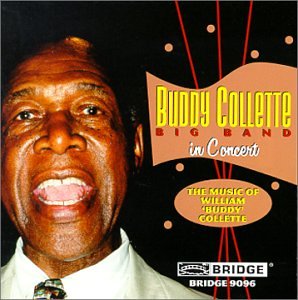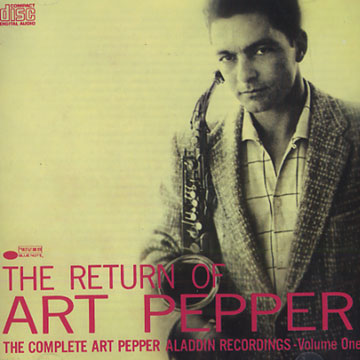Recent listening, current
Archived listening, 2013-2016
Showing posts with label west coast. Show all posts
Showing posts with label west coast. Show all posts
Sunday, August 17, 2014
196. Buddy Collette / Live from the Nation's Capital (2000)
Buddy Collette was an originator on the West Coast jazz scene. He cofounded the Chico Hamilton Quintet and devoted his time to education, as well as composing and performing. This live disc from 2000 captures a Collette program for the ages, and its disparate contents cover the arc of his career. Performance and audio production are slick, typical of groups billed on the national stage. There is a lot to enjoy. Professionalism aptly describes the soloists, who play snappy, expressive lines that don't disrupt the cascading harmonies. Arrangements are by several including Collette. No matter the arranger, though, the playlist is unified by breaking the group into combos, building tension, and using the whole ensemble for bursts of energized dramatics. Nothing new under sun as far as big band goes (Gerald Wilson or Sam Rivers orchs are more my style) but the infectious bounce on tracks like "Mr. and Mrs. Goodbye" hold a warm sentimentality for a bygone era while others, like the Afro-Cuban rhythm of "Andre" or improvs on "Blues #4" keep the pace and make good use of variety. Live from the Nation's Capital isn't the most essential big band record in my collection, but it offers a lot of good stuff and demonstrates (in a very straight way) the wide array of styles that Collette worked in throughout his career.
Saturday, December 7, 2013
156. Chet Baker / The Italian Sessions (1962)
Baker's groups in Europe were a mixed lot. Sometimes they were great but sometimes it was just the opposite. Then after a lifetime of drugs, alcohol, and legal trouble, his tone and technique suffered hugely. I like this disc because it is none of those things. It features Baker on the front line of a charging hard bop sextet. He holds his own flanked by piano, tenor sax, and guitar. His lines are so forthright and aggressive, so strident and even verbose (for Baker) that it hardly even sounds like him. I'm dying to put it in a blindfold test because it's such a curveball. The high spirited band gets started on the first track. "Well You Needn't" is one of two rhythmically thorny pieces in the session, the other being Charlie Parker's "Barbados." In the Monk tune, Baker careens along filling the space above and below him with a clarion tone and fast but thoughtful flits into the upper register. The drummer, Daniel Humair, drives the thing right over the top. Every track is short and concise -- no wasted space, no excessive showboating, no lost attention or bad takes. If you know the Let's Get Lost Chet Baker, the Californian bebop sensibility, the underplayed moody ballads and minimalistic statements in the lower register only, then you could revise that understanding, or at least enrich it, with these eight performances. They even do "Star Eyes," which is one of my favorite tunes by anyone.
Tuesday, September 10, 2013
136: Art Pepper / The Return of Art Pepper: The Complete Aladdin Recordings, Vol. 1 (1988)
There are two groups here, recorded 1956 and 1957. The first group features Pepper straight out of prison and recording again. It's a somewhat unbalanced group and Pepper's style is intact but languishing. This makes instructive listening, considering how hot he could be on a good recording, I find it fascinating to see between the lines for a few moments while his fingering isn't as nimble and the ideas are developing more slowly. There's some good balladry ("You Go to My Head") and some flashy piano and trumpet from left coasters Russ Freeman and Jack Sheldon. The gems, for me, come in the pickup band on tracks 11-15 with Joe Morello and Red Norvo. This group was put together on the fly, presumably with little or no rehearsal, and the miracle is that it's a really tight date with a really positive chemistry. Morello was leader. "Tenor Blooz," "Yardbird Suite" and "You're Driving Me Crazy" show Pepper's style in full flight. Also, Norvo and Carl Perkins, and Pepper's interplay with Perkins, are not to be missed. If I had the choice to keep one disc out of this Aladdin set, The Return of Art Pepper might not be my first choice, but the Morello/Norvo recordings redeem it.
Labels:
1956,
1957,
1988,
aladdin,
alto,
alto saxophone,
art pepper,
bebop,
blue note,
bop,
cool,
joe morello,
quintet,
red norvo,
sheldon,
the complete aladdin recordings volume 1,
the return of art pepper,
west coast
Tuesday, August 27, 2013
127. The Dave Brubeck Octet (1950)
I find this, the Octet's only studio album, a roaring good listen. I enjoy it alongside the Birth of the Cool by the Miles Davis Nonet. Both are similar in size and in their means of repurposing, so to speak, some of our more venerable standards like "What is this Thing Called Love" or "September in the Rain." The group's personnel is notable too, considering their different trajectories after the Octet: Tjader became known for the vibes, Van Kriedt for education, and Collins for Woody Herman. The pieces have tight arrangements that sound cool and loose, reeling with the energy and excitement of dixieland. But there's an ever present discipline behind them, too, and the innovation of infusing jazz with classical forms of writing and arranging. The soloists are concise, wrapping their choruses in 8 or 12 bars, staying close to the melody with strong voice leading. Many stayed in the repertoire of the Dave Brubeck Quartet so it's fun to compare the bobbing and weaving counterpoint with later performances of the same tunes, like our opener "The Way You Look Tonight," which I associate with Desmond's snarky quotes from Stravinsky and that nasty blues lick from Jazz at Oberlin. In fact, come to think of it, it's been a while since giving that one a spin....
Labels:
1950,
bob collins,
cal tjader,
classical,
cool,
dave brubeck,
dave brubeck octet,
dave van kriedt,
dick collins,
fantasy,
jack weeks,
octet,
paul desmond,
piano,
standards,
west coast,
william smith
Sunday, May 26, 2013
107. Desmond, Brubeck, Van Kriedt / Reunion (1957)
This meeting of the minds that have met before on many occasions is as relaxed as it is concise. David Van Kriedt was the tenor and collaborator in the Octet alongside Brubeck and Desmond. He continued into academia, also playing with Stan Kenton, while Brubeck and Desmond became performers. On Reunion, there are some tastes of the fugue style writing for which the Octet was famous (Bach's "Chorale," the only tune without a Van K. credit), although in the mood is, as I mentioned, quite a bit more relaxed than it was in the Octet. Back then, as the record shows, everyone seemed scrambling to out-do his last chorus. This time, while it sometimes sounds as if there's no clear leader, each man gets a fair share of time during improvisations and the music has the feel of care and balance. The group idea of musicality is very strong. Brubeck often picks up where Van Kriedt leaves off, or Desmond does, with occasional episodes that quote slyly from whatever is near at hand. It's soft, sophisticated music with occasional fireworks ("Shouts," listen for the Brubeck boulder that spins Desmond into a tizzy) and superb arrangements by Van Kriedt, like the sumptuous "Prelude." Van Kriedt's tone is smooth and full like Lester Young, and the timbre is the ideal mixer for Desmond's alto.
Monday, February 25, 2013
44. Harold Land / West Coast Blues! (1960)
Half the group is from New York and the other half from California, but the session doesn't sound like a novel meeting of East and West, and they actually sound like they know each other pretty well. Land is a good leader. He developed his own approach to hard bop on the tenor and was a prolific composer. This record features three of his compositions. He plays with a strong sense for the rhythm, and the influence of the blues haunts each lick. The opener is the sexy but hard swinging "Ursula," as good an introduction to Land's tone and style as any. He gets down to bop and rhythmic counterpoint by next covering Charlie Parker's complicated "Klactoveedsedstene." It's nice to hear Montgomery do a Charlie Parker composition because Bird was such a big influence on him, and of course, he's right at home. Joe Gordon takes some flashy solos and also plays nicely in unison with Land. In Land's provocative tone is the quality of a high harmonic that sounds like a signal just on the verge of breaking up, giving the music an urgency that isn't lost in the fullness of the whole sound. His style is bop-oriented and fluid, but very accessible, a clear intermediary between the music and the audience.
Wednesday, February 13, 2013
33. The Dave Brubeck Quartet / Jazz: Red Hot and Cool (1955)
Recorded live at New York's Basin Street club across three nights, this quartet isn't the same one that gelled on "Take Five," but the Joe Dodge/Bob Bates team sounds fine and contributes to the Brubeck formula admirably with rhythmical inspiration and some interesting polyrhythmic steering from Dodge. The pieces for the Morello-Wright band are already in place, like polytonality, polyrhythm and fugue-like structures. But these were already present during the days of the Dave Brubeck Octet, and earlier still during formative late nights at the Blackhawk. So if you're into Brubeck then there's plenty of good music here to enjoy. Sonny Rollins is credited in the notes of Saxophone Colossus for being the first jazz musician to develop his improvisations with an ear toward their musicality, as spontaneous compositions. That makes sense if Ira Gitler wasn't looking at the West Coast where Brubeck was doing exactly that. Full shifts in signatures mid tune, Desmond responding on the fly to Brubeck's harmonic cues -- as Brubeck's groups ever were, interesting music that rewards deep listening.
Subscribe to:
Posts (Atom)






